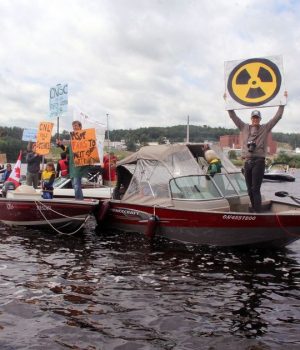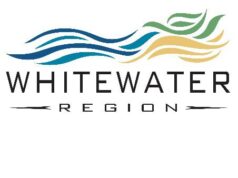ONTARIO — The need for urgent reform of Canada’s approach to radioactive waste has just been confirmed by findings from the global authority on nuclear matters, the International Atomic Energy Agency (IAEA), which completed an 11-day review mission to Canada on September 13. Canadian civil society groups say the IAEA findings validate their concerns about the substandard radioactive waste disposal plans of a consortium of SNC-Lavalin and two U.S. companies that is being paid close to $1 billion annually by the Government of Canada to deal with $8 billion worth of federal radioactive waste liabilities.
The IAEA mission was conducted by a 24-member team including 20 senior regulatory experts from 17 countries. An IAEA press release says the team’s final report will recommend that, “the Government of Canada enhance the policy and strategy for radioactive waste management,” and that, “the Canadian Nuclear Safety Commission should consider better aligning its radiation protection requirements with IAEA safety standards”.
“These recommendations are unprecedented from the explicitly pro-nuclear IAEA that is usually very accommodating to member states such as Canada”, said Dr. Gordon Edwards, president of the Canadian Coalition for Nuclear Responsibility. “We consider IAEA standards to be minimum standards that responsible nations should strive to exceed. For the IAEA to find the Federal Government and CNSC lacking, is a major red flag that should concern all Canadians.”
The review mission was conducted at the request of the Government of Canada, says the IAEA, but it also follows a public letter to the IAEA director general requesting an investigation into Canada’s radioactive waste polices and practices, in April of 2018. The letter’s signatories included five First Nations and 40 civil society groups.
Edwards and representatives of many other groups have charged that the Federal Government’s failure to develop policies and strategies for radioactive waste has given the SNC-Lavalin consortium free rein to deal with Canada’s $8 billion radioactive waste legacy that is spread across the provinces of Manitoba, Ontario and Quebec. They point out that the resulting plans to pour concrete over old nuclear reactors and dump radioactive waste beside drinking water sources fall far short of international safety standards.
“The Government of Canada is not just putting us all at risk by pouring money into bad nuclear waste projects, it is missing a golden opportunity to develop leadership and excellence in radioactive waste management on a global scale,” according to Johanna Echlin of the Old Fort William (Quebec) Cottagers’ Association. “We call upon all media, the public and candidates in the upcoming election to press for an urgent reform of Canada’s approach to radioactive waste matters” she said. “Canada must take this opportunity to not just meet but exceed IAEA standards, and ensure the protection of Canadians today, and for centuries to come.”
“This is a tremendous vindication of our concerns about how radioactive waste is being mishandled in Canada” according to Gilles Provost, of the Ralliement contre la pollution radioactive. “We have been telling the Federal Government for years that its radioactive waste policies are inadequate, and now world experts from the IAEA are saying the same thing.”
The IAEA is a United Nations organization that recommends safety standards for nuclear plants and nuclear waste facilities; it has 171 member states worldwide. It also administers an international convention on the management of radioactive waste to which Canada is a party.






![Kenopic/Smith Auction [Paid Ad]](https://whitewaternews.ca/wp-content/uploads/2018/10/advertising-100x75.jpeg)

